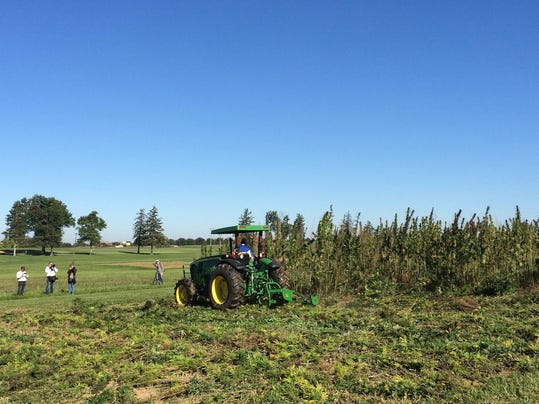Source: courier-journal.com

A year after Kentucky's agriculture department went to court to get hemp seed released for its research programs, a German exporter's failure to obtain the proper paperwork apparently will lead to the destruction of more than three tons of seed sitting in Chicago.
"That's not what we want, but, unfortunately, that's the situation where we're at," said Adam Watson, the coordinator of industrial hemp programs for the Kentucky ag department. "Snafus happen. ... It's not that we think there was any bad actor involved, but there apparently were mistakes involved."
The paperwork problem will reduce or eliminate the seed for almost a fourth of this year's research projects allowed under the 2014 Farm Bill that sets out federal agriculture policy. Since most of these projects are smaller in nature, the impact on Kentucky's hemp acreage is closer to 5 percent of the crop, Watson said.
The department doesn't directly obtain seed, which is a business transaction between growers and suppliers, but Watson said the department is considering taking a more active role in the future after the problem this year.
Seed for last year's first crop initially was held up over drug law issues, which resulted in a brief court battle, but this year's issue is the result of a German exporter's failure to get a routine agricultural paper called a Phytosanitary Certificate. According to the U.S. Department of Agriculture's website, the certificate is used to track "the inspection of agricultural products and certifies compliance with plant health standards of importing countries."
"It's not anything special to industrial hemp or even seeds, period," Watson said. The certificate "is very common within the agriculture industry whether you're importing or exporting. It ensures that you don't have plant diseases, animal diseases, noxious weeds, insects, things like that, entering or exiting countries."
The Kentucky department became aware of the problem in late May, Watson said. The USDA already granted an extension to produce the paperwork but, apparently, Germany wouldn't issue the certificate after the fact when the seed already had been shipped to the United States, Watson said.
Watson said the Kentucky agriculture department believes that the USDA and customs officials have done their best to help, "but they're bound by regulations." He said the Drug Enforcement Administration permits that were the issue last year weren't a problem this year.
The amount of seed stuck in Chicago is about 6,600 pounds, which would result in about 100 field acres, Watson said. In all, the Kentucky hemp crop this year is planned to be about 1,700 acres in 38 projects. The seed shipment would serve nine projects.
While some growers won't have this variety of hemp desired for fiber "by and large the impact on the entire program as a whole is very minimal," Watson said. He said the department is looking at finding other sources of seeds for growers who might havenone now because of the issue.
Another USDA extension is being sought, Watson said, but it's questionable whether the problem can be fixed even if the extension is granted. The options for federal regulators are destroying the shipment or sending it back — an alternative where the costs likely would outweigh the benefits, Watson said, particularly because the growing season for hemp already is well underway and because of the additional shipping costs.
A USDA spokeswoman was not prepared Thursday to comment on the status of the shipment.
Going forward, Watson said the department is considering being more involved in acquiring seeds and moving up the deadline for proposing hemp projects to the department to give more time for seed, the supply of which is limited according to some reports, to be obtained more easily. The department received 326 applications this year.
"This is the one shipment that didn't make it here this season," Watson said, noting that plants already are out of the ground from other shipments. "We regret that this happened, but the program as a whole is still moving forward."
No comments:
Post a Comment